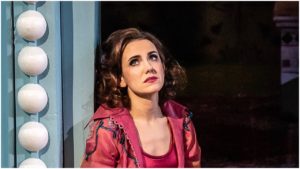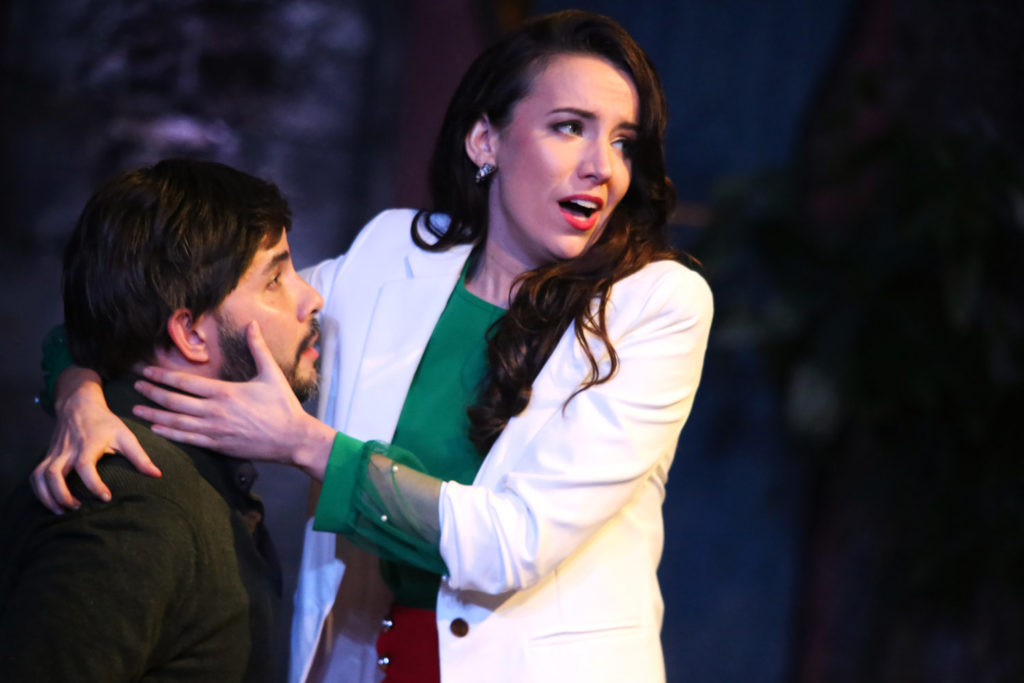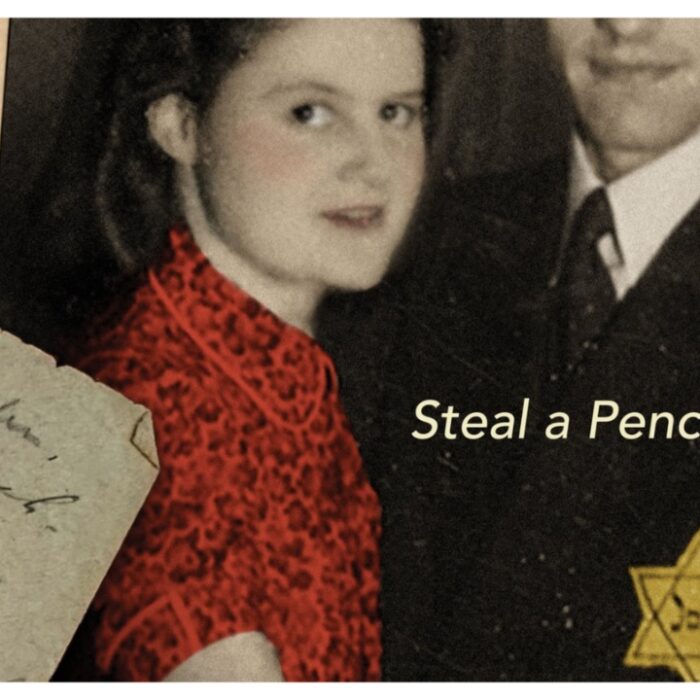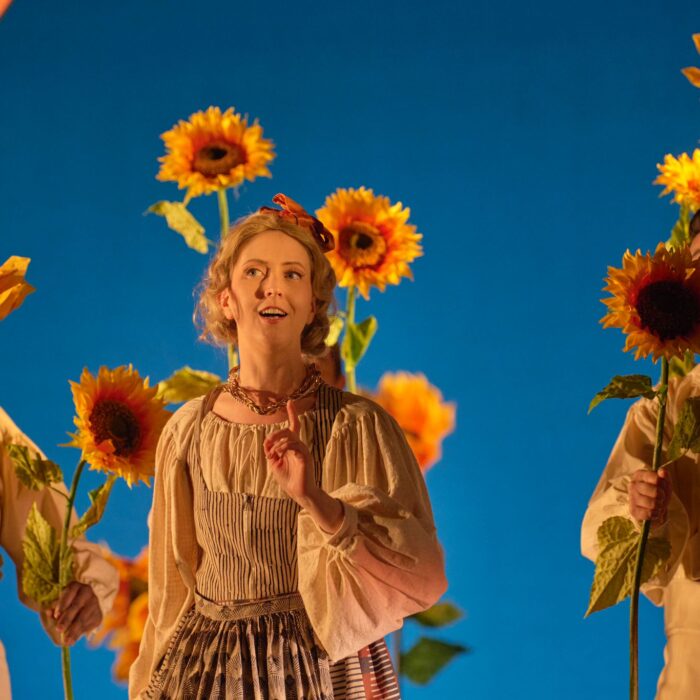
Q & A: Rachel Kelly On Growing Up In A Musical Family, Her Favorite Composer & Dealing With The Stresses Of The Job
By Alan Neilson(Photo: Clive Barda)
Anyone who was fortunate enough to attend a performance of Rossini’s one act farsa “Adina” at this year’s Wexford Festival Opera, or managed to catch the broadcast on RTE’s Lyric FM could not fail to have been enthused by mezzo-soprano Rachel Kelly’s stunning interpretation in the title role.
Since impressing on the Jette Parker Young Artists Programme at Covent Garden, from which she graduated in 2015, Kelly has established herself as an interpreter of Mozart and Rossini roles as well as within the baroque repertoire, receiving a raft of favorable reviews, which praise the interpretative strength of her performances, her rich vocal colours, versatility and dazzling coloratura.
Fortunately, she is singer with huge reserves of energy, so she was more than happy to make time for an interview with OperaWire, an interview which proved to be a wide-ranging affair, not only revealing her enthusiasm for opera, but an acute intelligence, and an approach to her career grounded on the practicalities and realities of being a professional singer.
OperaWire: What made you want to become a singer?
Rachel Kelly: I was hothoused! I am kidding of course, but both sides of my family were very musical. My grandfather on my father’s side was a composer, particularly well-known for his choral music, and was also a music teacher. My mother is a concert pianist and a musicologist, who has written many books on Irish composers, and my aunt, Fionnualla Hunt, is a violinist: she was leader of the London Symphony Orchestra and also of Solti’s Orchestra for Peace. So music has always been present and played an important part in my life.
I was trained as a concert pianist and as flautist; it was very intense and very tough, at times. I had to do hours of piano and flute practice, as well as my school work. Of course, I am very grateful now that I had these opportunities. Singing, on the other hand, was always something I did for fun which was an important catharsis for me.
Then, one day when I was a teenager my mother said I should start having singing lessons. I was not too enthusiastic at the time, because I had so many extra-curricular activities, piano, flute, dance, but she insisted, saying, “No, you can do it!” So it was my mother who pushed me in this direction, and it was the best thing she ever did for me. I attended classes with Mary Brennan. But I wasn’t allowed to stop all the other activities.
At this point I was not considering a career in music. I was going to study Law at Trinity when I finished school. Then, at the last minute I thought I would rather try to become an opera singer, and if I failed, I thought, “ok I tried!” which would be better than thinking “What if?”
Things then moved quickly: I studied music at the Royal Academy in Dublin, making my professional debut at 19 with the National Symphony Orchestra in Dublin, singing Schumann’s “Das Paradies und die Peri.” After Dublin I received a scholarship to study in London.
OW: You received a scholarship for the Jette Parker Young Artists Programme at Covent Garden. What did you gain from your time there?
RK:I received excellent language coaching, I understudied big roles, and sang a lot of smaller roles on the big stage, but the main thing was the experience, the experience of working with wonderful singers, people such as Roberto Alagna and Joyce di Donato.
I am the type the person who wants to talk to people about their singing if I admire something that they do, and they were all so helpful. Everybody gave me something. I was like a sponge, soaking it all in. Singing with high quality singers on a stage was very important; there is no substitute for this. When you are surrounded by people who are at a high level, you realize the standard you must aim for, and what you must do to achieve the same level, so you up your game.
Being in the same environment as people who operate at the top of their game is so important. They give you so much help and advice. Aleksandra Kurzak was so kind to me, she talked to me about how to control my breathing at great length and was also very complimentary about my singing. It helped me so much.
OW: You have just finished singing the title role in Rossini’s “Adina.” What are your thoughts about the role, and did you enjoy the experience?
RK: This has been one of the joys of my career so far. My voice has a dark color, but it is unusual in that though I have been classified as a mezzo-soprano, I can sing some soprano roles as I have the high notes too. And the role of Adina allowed me to show off the whole of my voice.
It is a fantastic role. Adina is a naïve young girl, but with a very strong character. She doesn’t understand the love she has for the Caliph which is, in fact, a filial love, the love between a father and daughter. The Caliph doesn’t understand it either. They think it is romantic love, that it is eros. This is why she feels bad about betraying him, and she doesn’t understand why. She wants to run away with Selimo, but feels beholden to the Caliph, the man who abducted her, and this is obviously something hard-wired, maybe an unconscious recognition that this man is her father.
Then there is final aria from Adina, WOW! It is not from a comedy, it is the most incredible aria. I know that the director, Rosetta Cucchi, made much of the comedy, but the music is so rich, and the line, “I don’t have enough to cry,” it could come from a tragedy.
Rossini is my favurite composer. When the orchestra starts, I feel joy all through my body. His music is infectious. I would have loved to have met him.
And he really knew how to write for the voice. Rossini’s crescendo is so cleverly written: he deliberately starts the voice low and brings it up a little, then goes back down, then in the quartet takes it up again, then back down again, before letting it soar in the the final aria. It is so good for two reasons: firstly, as the opera progresses, the audience gets more and more voice from the singer, which is exciting, and secondly, he is warming the singer up throughout the show, so that you can hit the high notes at the end. It is the same for so many of his characters, Rosina, Adina, Semiramide, Cenerentola. He is a genius at writing for the voice, because he understands it so well.

(Credit: Frances Marshall)
OW: How important is it for an Irish singer to sing at the Wexford Festival Opera?
RK: Very important! There are not many opportunities to sing in Ireland, so it is great to be able to sing in my own country. Also it is such a prestigious festival, with such great artists. It is just a wonderful experience.
Also I have very close links with the town, and with this year’s festival in particular. My grandfather, T.C.Kelly came from Wexford, his family owned a bakery on the High Street. My mother is producing Stanford’s “The Veiled Prophet,” and my auntie is the leader of the orchestra. So you can imagine it is a very special occasion for me.
OW: There is also the lesser-known Blackwater Festival at Lismore, at which you have also sung. How do you view its role in the musical landscape of Ireland?
RK: I think what they are doing at Blackwater is marvelous. It is a smaller scale festival, but everything they do, they do with passion. I am very fond of this festival.
I made my professional debut as an opera singer in the role of Cherubino at the festival, so it provided me with an opportunity, as it has done for many Irish singers. What they do there shows great ambition, and it is so full of potential. I know finance is always a problem for opera companies, and Blackwater has to compete for funding, which is difficult, but I know that they have plans to expand, and I really hope they can do it. It would be great for opera in Ireland.
OW: You also sing in baroque operas. Does your approach and preparation differ from that which you use for singing Mozart or Rossini?
RK: My preparation is always the same. I approach everything with a bel canto technique. Once the voice is free, and the muscles remember, then I can iron out the sound, and find a more straight tone. I think it is very important to sing it in the style it is supposed to be sung. There is nothing more ghastly than singing baroque in the style of, say, verismo.
On the other hand, I want to be free to sing everything. I don’t want to be pigeonholed. If I specialize in the baroque school, I won’t be able to sing Rossini they way I do now, because the voice will move in that direction. My approach is bel canto, and I want to keep it that way!
Mozart, too. He is different again. It needs a purity of sound. While with Rossini I can let the voice go a bit more. So the styles are different, but the approach is the same: bel canto
OW: In May 2020, you will be singing Offred in Ruder’s “The Handmaid’s Tale” at the Royal Danish Opera. What made you want to perform this role?
RK: I love Margaret Atwood, and for me “The Handmaids Tale” is a seminal work of dystopian speculative fiction and feminist literature. As a woman it is great opportunity and so I could not turn it down. I am super excited about it. John Fulljames is directing. I worked with at Covent Garden, which was a great experience. So it will be good to work with him again.
The music is very challenging, it is contemporary in style, but as an artist you must stretch yourself. My approach, however, will remain the same: bel canto.
OW: How do you deal with vocal problems and negative criticism?
RK: It is all about the mind. The voice remains the same, it is the mind, or the mood which changes. I find that by using meditation I am able to clear my mind and find calm, and it is amazing how it the becomes possible to unlock the voice. I am not a Buddhist, but I am inspired by the ideas of Buddhism, so if my voice isn’t working, then I say, ‘Okay there is a bit of phlegm on the voice, but it is the same voice, and my technique is the same, I know how to breathe and if it is really that bad I can always cancel.’ The point is not to resist reality. It was my husband who helped me with this because he was the one who started to meditate, and to take a more philosophical approach to life, and it has helped me a lot.
It is the same with criticism. As an artist on stage you have to be totally open, otherwise no one will go with you emotionally, you have to let your guard down, which means that when someone criticizes you it can have an impact; even a small criticism can stick with you all day. By taking a more philosophical approach I have found it is less upsetting. I can step back from it. Some people’s job is to critique, mine is not to stress about that, but to sing.
OW: What are your medium and long term ambitions?
RK: To sing in the great opera houses of the world. To continue with the Mozart and bel canto repertoire. Obviously, what I will sing depends upon my voice. I will follow my voice. If it takes me up to soprano level, to Verdi, then I will follow it. But I won’t force it. So at the moment I am happy to wait and see.



